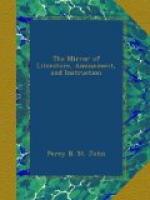The archbishop placed the sword upon this tomb, and then Byron, to inspire the Greeks with enthusiasm, advanced with a religious silence, and stopping all on a sudden, he pronounced this discourse in the Greek tongue:—“What man reposes buried under this stone? What hollow voice issues from this tomb? What is this sepulchre, from whence will spring the happiness of Greece? But what am I saying? Is it not the tomb of Marco Botzaris, who has been dead some months, and who, with a handful of brave men, precipitated himself upon the numerous ranks of the most formidable enemies of Greece? How dare I approach the sacred place where he reposes—I, who neither possess his heroism nor his virtues? However, in touching this tomb, I hope that its emanations will always inflame my heart with patriotism.” So saying, and advancing towards the sepulchre, he kissed it while shedding tears. Every spectator exclaimed, “Lord Byron for ever!” “I see,” added his lordship, “the sword and the letter of citizenship, which the government offers me; from this day I am the fellow-citizen of this hero, and of all the brave people who surround me. Hellenes! I hope to live with you, to fight the enemy with you, and to die with you if it be necessary.” Byron, superior to vulgar prejudice, saw in the manners of the pallikares an ingenuous simplicity, a manly frankness and rustic procedure, but full of honour; he observed in the people a docility and constancy capable of the greatest efforts, when it shall be conducted by skilful and virtuous men; he observed amongst the Greek women natural gaiety, unstudied gentleness, and religious resignation to misfortunes.
Byron did not pretend to bend a whole people to his tastes and European habits. He came not to censure with a stern look their costumes, their dances, and their music; on the contrary, he entered into their national dances, he learned their warlike songs, he dressed himself like them, he spoke their language; in a word, he soon became a true Roumeliote. Consequently, he was adored by all Western Greece; every captain acknowledged him with pleasure as his chief; the proud Souliots gloried in being under his immediate command. The funds of the first loan being addressed to him, and submitted to his inspection, gave him influence, not only over continental Greece, but even over the Peloponnesus; so that he was in a situation, if not sufficient to stifle discord, at least to keep it within bounds. Not having yet fathomed the character of all the chief people, as well civil as military, he was sometimes deceived in the beginning of his sojourn, which a little hurt his popularity; but being completely above trifling passions, being able to strengthen by his union with it the party which appeared to him the most patriotic, he might without any doubt, with time and experience, have played a part the most magnificent and salutary to Greece. At first he had constructed, at his own expense, a fort in the little isle of Xeclamisma,




